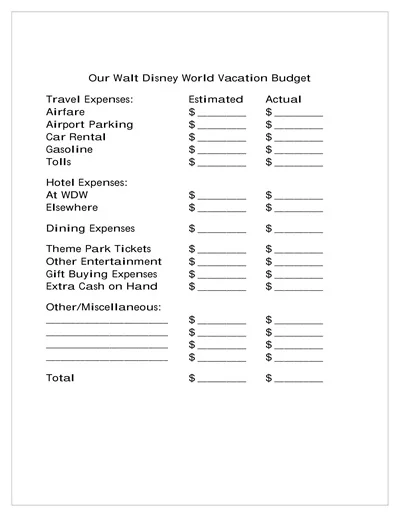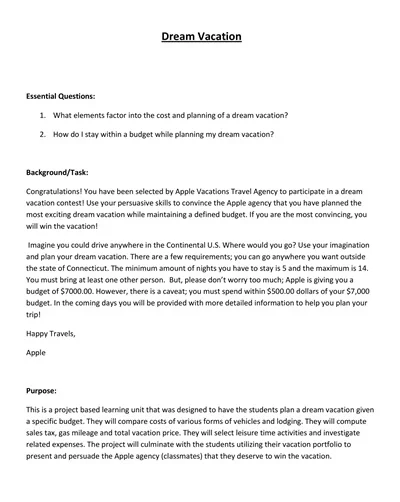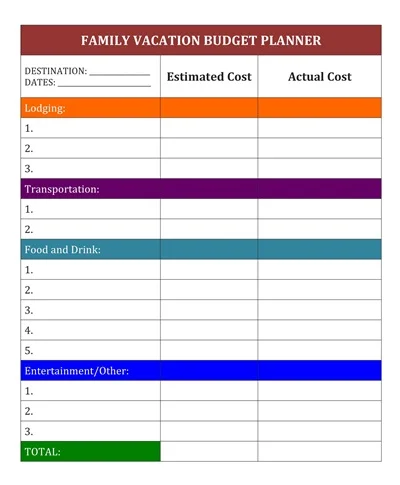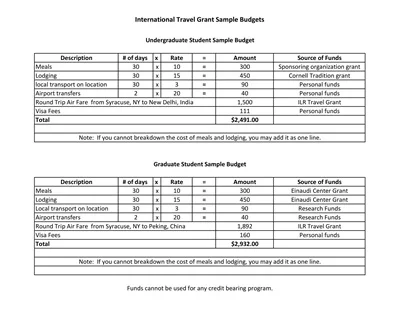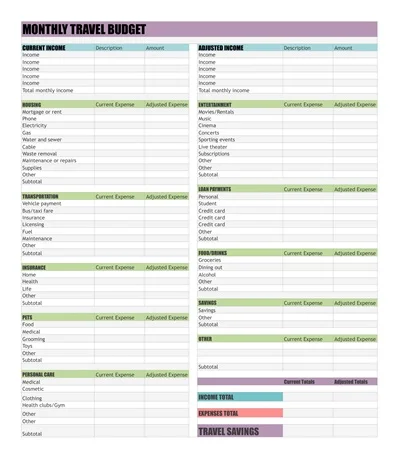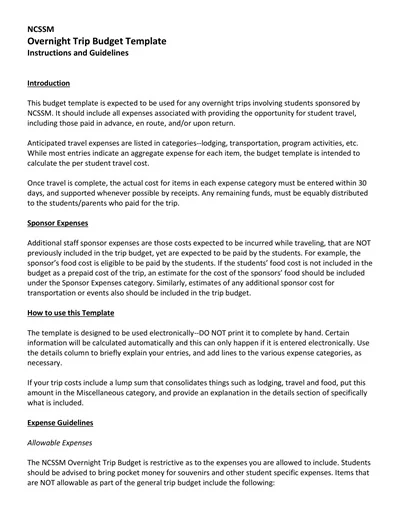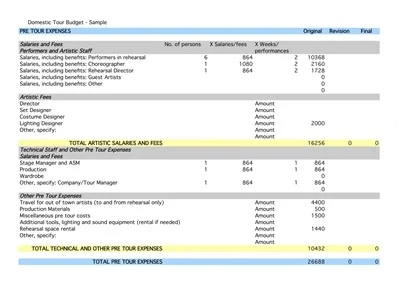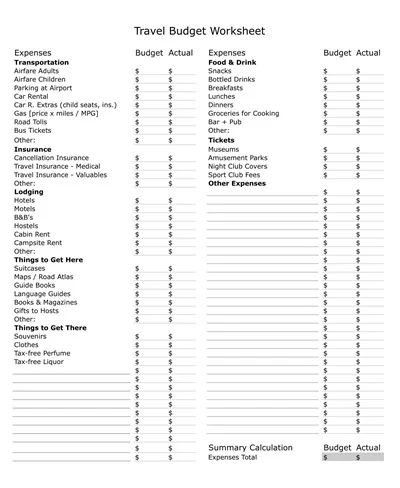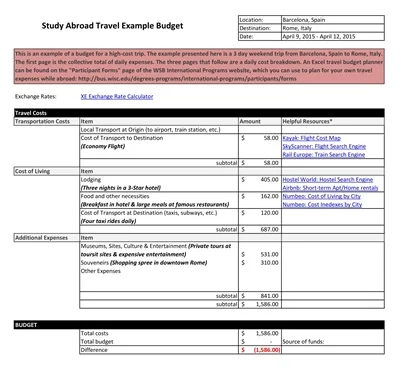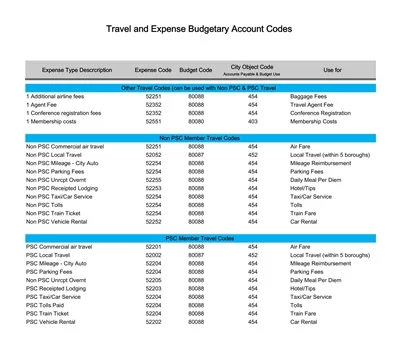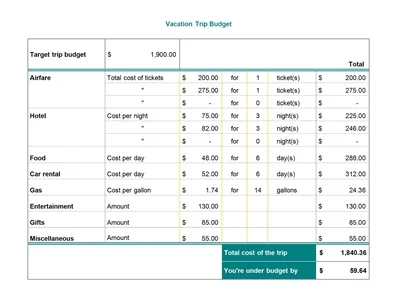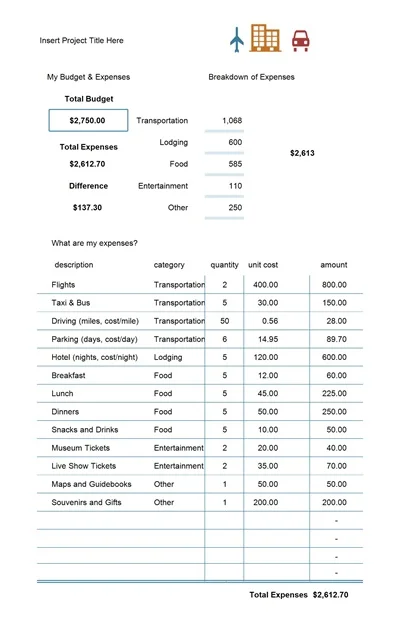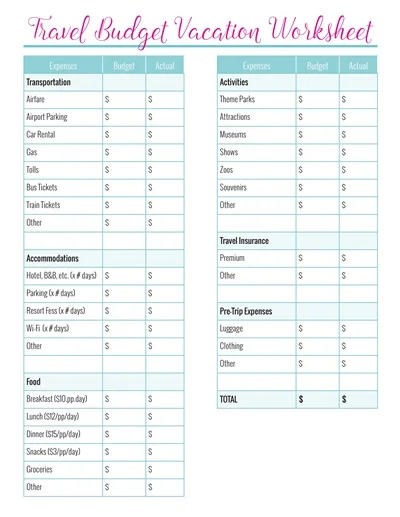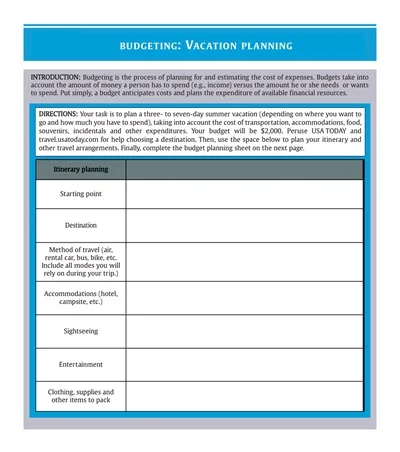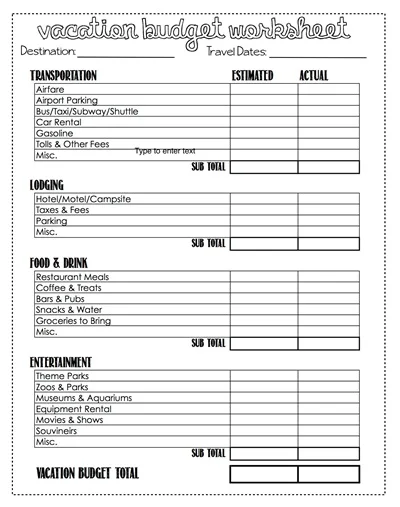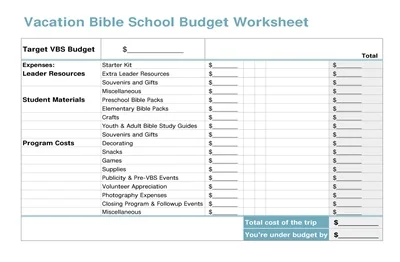A Travel Budget Template is a pre-organized format used by travelers to estimate and track the expenses of a trip. This template typically includes categories such as transportation, accommodation, food, activities, and emergency funds.
It allows travelers to allocate their funds efficiently, ensuring that all aspects of the trip are covered financially without overspending. By using a travel budget template, individuals can plan their trips more effectively, making it easier to enjoy their experiences without financial stress.
Download Free Simple Travel Budget Templates
What is a Travel Budget?
A travel budget is a financial planning tool that outlines the expected costs associated with a trip, including transportation, accommodation, food, activities, and any other expenses. It serves as a roadmap to manage spending, ensuring that travelers can enjoy their experiences without financial stress.
By carefully itemizing and allocating funds for various aspects of the trip, individuals can make informed decisions, prioritize spending, and find ways to save, making travel both enjoyable and affordable.
Elements of a Travel Budget
A comprehensive travel budget should include several key categories to ensure all costs are accounted for.
The main elements to consider are:
- Transportation: This covers all travel costs to your destination and within it, including flights, trains, buses, car rentals, and local public transport.
- Accommodation: Budget for hotels, hostels, vacation rentals, or camping fees, depending on your preference and the nature of your trip.
- Food and Drink: Estimate daily spending on meals, snacks, and beverages. This can vary widely depending on whether you plan to eat out at restaurants or prepare your food.
- Activities and Entry Fees: Include the cost of admission for attractions, tours, museums, parks, or events you plan to attend.
- Shopping and Souvenirs: Allocate a portion of your budget for shopping, gifts, and souvenirs to bring back home.
- Emergency Fund: Always have a contingency fund for unexpected expenses or emergencies.
Remember, planning and allocating your budget wisely can lead to a more enjoyable and stress-free travel experience.
Importance of Travel Budget
Crafting a travel budget is crucial for several reasons. Firstly, it ensures that your travel expenses are well-planned and accounted for, preventing you from overspending or facing financial difficulties during or after your trip.
A well-structured budget also allows travelers to make informed decisions about their destinations, accommodation, transportation, and activities, ensuring that they can enjoy their trip without the stress of mounting debts. Additionally, having a budget encourages travelers to explore cost-effective options, potentially leading to more authentic and enriching travel experiences, as they look beyond tourist traps and high-priced attractions.
Common Budgeting Mistakes to Avoid
Budgeting is an important aspect of personal finance that helps individuals and families manage their finances effectively. However, budgeting can be a challenging task for many people, and mistakes are often made. In this section, we will discuss some common budgeting mistakes to avoid.
1. Not Setting Clear Financial Goals
Failing to define clear, achievable goals can lead to a lack of direction in your spending and saving habits. Without goals, it’s challenging to measure progress or find the motivation to budget effectively.
2. Underestimating Expenses
One of the most common mistakes is not accounting for all expenses, both fixed and variable. This can lead to overspending and not having enough funds allocated for savings or unexpected costs.
3. Overlooking the Importance of an Emergency Fund
Neglecting to build and maintain an emergency fund can put you in a vulnerable position in case of sudden financial needs. An adequate emergency fund covers 3-6 months of living expenses.
4. Failing to Adjust the Budget
A budget isn’t set in stone. It requires regular review and adjustments to reflect changes in income, expenses, and financial goals. Not updating your budget can lead to overspending or not making the most of potential savings.
5. Ignoring Small Expenses
Small, seemingly insignificant expenses can add up quickly, derailing your budget. It’s essential to track these expenditures to gain a comprehensive view of your spending habits.
Benefits of Using a Travel Budget
Creating and sticking to a travel budget has several key benefits that can make your trips more enjoyable and stress-free.
Here are a few to consider:
- Financial Control: A travel budget helps you take charge of your finances, ensuring you know exactly how much you can afford to spend on your trip. This minimizes the risk of overspending and potential financial stress.
- Better Planning: When you allocate a specific amount of money for different aspects of your trip, such as accommodation, food, and activities, it forces you to research options and make decisions in advance. This can lead to a smoother, more organized travel experience.
- More Travel Opportunities: By saving money on one trip through effective budgeting, you might find yourself with surplus funds that can be used for future travels. Budgeting effectively allows your travel funds to go further.
- Prioritize Spending: A travel budget helps you determine your priorities. If you know you want to splurge on a special excursion or a luxurious dinner, you can plan to save in other areas, ensuring you’re spending money on what matters most to you.
- Unexpected Expenses: A good travel budget includes a contingency fund for unexpected expenses. This can give you peace of mind, knowing that you’re prepared for any mishaps without blowing your budget.
Tips for Saving Money While Traveling
Traveling can be one of life’s greatest joys, but it often comes at a steep cost. However, with smart planning and strategic choices, you can significantly reduce your expenses and enjoy more for less.
Here are some effective tips for saving money while on the go:
Book in Advance
Booking your flights, accommodations, and even some activities in advance can lead to substantial savings. Airlines and hotels often offer early bird rates that are much lower than the prices closer to your travel date.
Travel During Off-Peak Seasons
Choosing to travel during the off-peak seasons can result in lower prices for flights and accommodations, as well as fewer crowds at popular destinations. This typically includes times outside of major holidays and school vacation periods.
Use Public Transportation
Public transportation is not only more environmentally friendly, but it’s also much cheaper than relying on taxis or renting a car. Many cities offer tourist passes for unlimited travel within a set period, which can be a great value.
Opt for Accommodations with Kitchen Facilities
Staying in accommodations that offer kitchen facilities can save you a lot of money on food. Even simple meals prepared at your temporary home can significantly reduce your overall travel expenses.
Seek Out Free Activities
Many destinations offer a wealth of free activities, from walking tours to museum entry days and natural wonders. Doing a bit of research before you go can uncover some fantastic experiences that won’t cost you a dime.
Use Discount Cards and Coupons
Look for discount cards specific to the area you are visiting, which can offer savings on a variety of attractions, dining, and even transportation. Coupons and promo codes can also be found for activities and restaurants.
How to Make a Travel Budget Template
Creating a travel budget template is essential for managing your expenses and ensuring you can enjoy your trip without financial stress. Follow these steps to make a comprehensive and user-friendly template:
- Estimate Total Trip Cost: Begin by estimating the total cost of your trip, including all known and potential expenses.
- Airfare or transportation costs
- Accommodation expenses
- Daily food and drink budget
- Local transportation (rental car, public transit, taxis)
- Activities and excursion fees
- Miscellaneous (shopping, souvenirs, emergency funds)
- Break Down Expenses by Category: Organize your budget into clear categories for easier tracking.
- Transportation
- Lodging
- Meals
- Activities
- Miscellaneous
- Allocate Funds: Decide how much money you will allocate to each category based on your total budget and the importance of each category to your travel experience.
- Track Spending: Create a section in your template where you can log expenses during your trip. This can help you stay on budget and make adjustments as necessary.
- Include a Buffer: Always include a buffer of 10-20% of your total estimated budget for unexpected expenses.
- Review and Adjust: After your trip, review your spending to identify areas where you can save money in the future.

